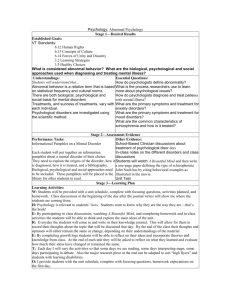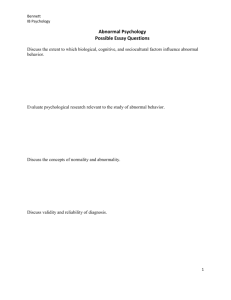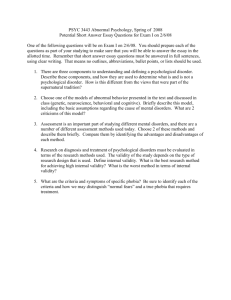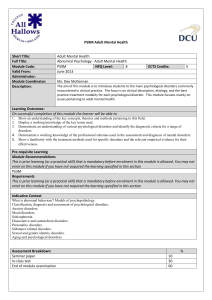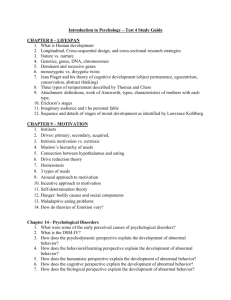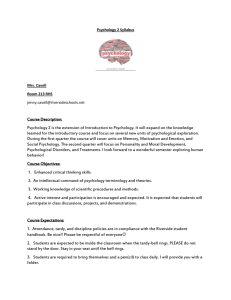Comer, Abnormal Psychology, 8th edition
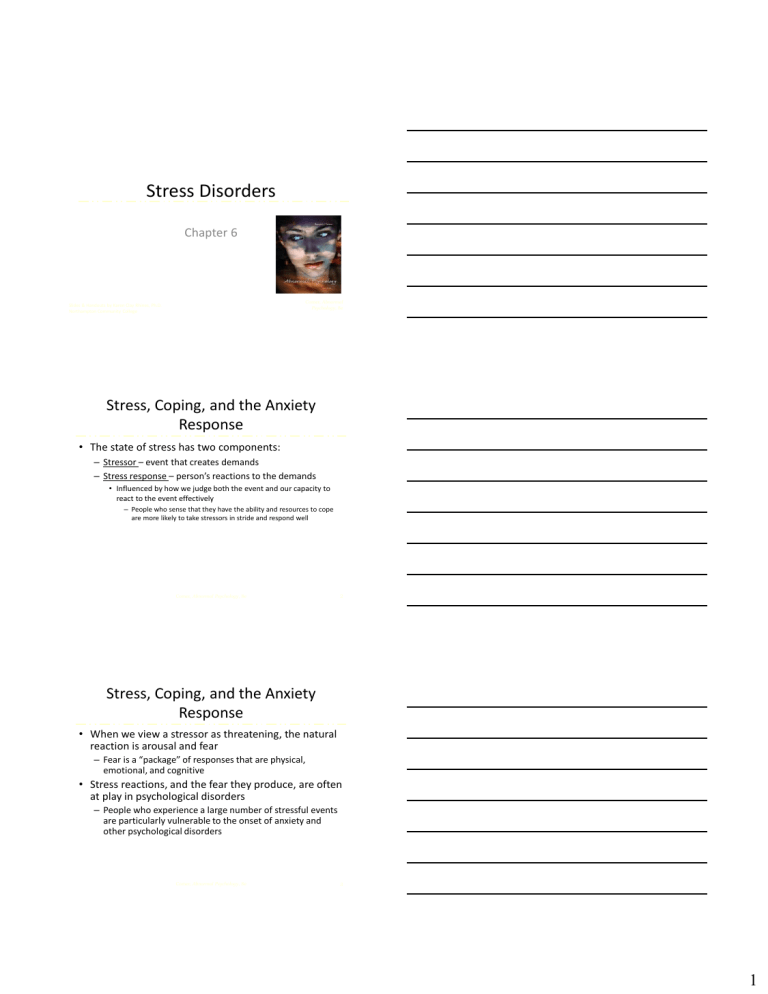
Stress Disorders
Chapter 6
Slides & Handouts by Karen Clay Rhines, Ph.D.
Northampton Community College
Comer, Abnormal
Psychology , 8e
Stress, Coping, and the Anxiety
Response
• The state of stress has two components:
– Stressor – event that creates demands
– Stress response – person’s reactions to the demands
• Influenced by how we judge both the event and our capacity to react to the event effectively
– People who sense that they have the ability and resources to cope are more likely to take stressors in stride and respond well
Comer, Abnormal Psychology , 8e 2
Stress, Coping, and the Anxiety
Response
• When we view a stressor as threatening, the natural reaction is arousal and fear
– Fear is a “package” of responses that are physical, emotional, and cognitive
• Stress reactions, and the fear they produce, are often at play in psychological disorders
– People who experience a large number of stressful events are particularly vulnerable to the onset of anxiety and other psychological disorders
3 Comer, Abnormal Psychology , 8e
1
Stress, Coping, and the Anxiety
Response
• Stress also plays a more central role in certain psychological disorders, including:
– Acute stress disorder
– Posttraumatic stress disorder (PTSD)
– Technically, DSM-IV-TR lists these patterns as anxiety disorders
• …as well as certain physical disorders, called psychophysiological disorders
– These disorders are listed in the DSM-IV-TR under
“psychological factors affecting medical condition”
Comer, Abnormal Psychology , 8e 4
Stress and Arousal:
The Fight-or-Flight Response
• The features of arousal and fear are set in motion by the hypothalamus
– Two important systems are activated:
• Autonomic nervous system (ANS)
–
An extensive network of nerve fibers that connect the central nervous system (the brain and spinal cord) to all other organs of the body
• Endocrine system
– A network of glands throughout the body that release hormones
5 Comer, Abnormal Psychology , 8e
Stress and Arousal:
The Fight-or-Flight Response
• There are two pathways, or routes, by which the ANS and the endocrine system produce arousal and fear reactions:
– Sympathetic nervous system pathway
– Hypothalamic-pituitary-adrenal pathway
Comer, Abnormal Psychology , 8e 6
2
Stress and Arousal:
The Fight-or-Flight Response
• When we face a dangerous situation, the hypothalamus first excites the sympathetic nervous system, which stimulates key organs either directly or indirectly
• When the perceived danger passes, the parasympathetic nervous system helps return body processes to normal
Comer, Abnormal Psychology , 8e 7
The Autonomic Nervous System
Comer, Abnormal Psychology , 8e 8
Stress and Arousal:
The Fight-or- Flight Response
• The second pathway is the hypothalamicpituitary-adrenal (HPA) pathway
– When we are faced by stressors, the hypothalamus signals the pituitary gland, which stimulates the adrenal cortex to release corticosteroids – stress hormones – into the bloodstream
9 Comer, Abnormal Psychology , 8e
3
Stress and Arousal:
The Fight-or-Flight Response
• The reactions on display in these two pathways are collectively referred to as the fight-or-flight response
• Each person has a particular pattern of autonomic and endocrine functioning and so a particular way of experiencing arousal and fear…
Comer, Abnormal Psychology , 8e 10
Stress and Arousal:
The Fight-or-Flight Response
• People differ in:
– Their general level of arousal and anxiety
•
• Called “trait anxiety”
Some people are usually somewhat tense; others are usually relaxed
• Differences appear soon after birth
– Their sense of which situations are threatening
•
Called “state anxiety”
•
Situation-based (example: fear of flying)
Comer, Abnormal Psychology , 8e 11
The Psychological
Stress Disorders
• During and immediately after trauma, we may temporarily experience levels of arousal, anxiety, and depression
– For some, symptoms persist well after the trauma
• These people may be suffering from:
–
Acute stress disorder
–
Posttraumatic stress disorder (PTSD)
– The precipitating event usually involves actual or threatened serious injury to self or others
• The situations that cause these disorders would be traumatic to anyone (unlike other anxiety disorders)
12 Comer, Abnormal Psychology, 8e
4
The Psychological
Stress Disorders
• Acute stress disorder
– Symptoms begin within four weeks of event and last for less than one month
• Posttraumatic stress disorder (PTSD)
– Symptoms may begin either shortly after the event, or months or years afterward
• As many as 80% of all cases of acute stress disorder develop into PTSD
Comer, Abnormal Psychology , 8e 13
Comer, Abnormal Psychology , 8e 14
The Psychological
Stress Disorders
• Aside from the differences in onset and duration, the symptoms of acute stress disorders and PTSD are almost identical:
– Reexperiencing the traumatic event
– Avoidance
– Reduced responsiveness
– Increased arousal, anxiety, and guilt
Comer, Abnormal Psychology, 8e 15
5
Why Do People Develop a Psychological
Stress Disorder?
• Clearly, extraordinary trauma can cause a stress disorder
– However, the event alone may not be the entire explanation
• To understand the development of these disorders, researchers have looked to the:
– Survivors’ biological processes
– Personalities
– Childhood experiences
– Social support systems
– Cultural backgrounds
– Severity of the traumas
Comer, Abnormal Psychology , 8e 16
Why Do People Develop a Psychological
Stress Disorder?
• Biological and genetic factors
– Traumatic events trigger physical changes in the brain and body that may lead to severe stress reactions and, in some cases, to stress disorders
• Personality factors
– Some studies suggest that people with certain personalities, attitudes, and coping styles are particularly likely to develop stress disorders
– A set of positive attitudes (called resiliency or hardiness) is protective against developing stress disorders
17 Comer, Abnormal Psychology , 8e
Why Do People Develop a Psychological
Stress Disorder?
• Childhood experiences
– Researchers have found that certain childhood experiences increase risk for later stress disorders
– Risk factors include:
•
An impoverished childhood
• Psychological disorders in the family
• The experience of assault, abuse, or catastrophe at an early age
• Being younger than 10 years old when parents separated or divorced
18 Comer, Abnormal Psychology , 8e
6
Why Do People Develop a
Psychological Stress Disorder?
• Social support
– People whose social support systems are weak are more likely to develop a stress disorder after a traumatic event
• Multicultural factors
– There is a growing suspicion among clinical researchers that the rates of PTSD may differ among ethnic groups in the US
Comer, Abnormal Psychology, 8e 19
Why Do People Develop a
Psychological Stress Disorder?
• Severity of the trauma
– Generally, the more severe the trauma and the more direct one’s exposure to it, the greater the likelihood of developing a stress disorder
• Especially risky: Mutilation and severe injury; witnessing the injury or death of others
Comer, Abnormal Psychology, 8e 20
How Do Clinicians Treat the
Psychological Stress Disorders?
• About half of all cases of PTSD improve within 6 months; the remainder may persist for years
• Treatment procedures vary depending on type of trauma
– General goals:
• End lingering stress reactions
• Gain perspective on painful experiences
• Return to constructive living
21 Comer, Abnormal Psychology, 8e
7
How Do Clinicians Treat the
Psychological Stress Disorders?
• Treatment for combat veterans
– Drug therapy
– Behavioral exposure techniques
– Insight therapy
• Psychological debriefing
– A form of crisis intervention that has victims of trauma talk extensively about their feelings and reactions within days of the critical incident
Comer, Abnormal Psychology, 8e 22
The Physical Stress Disorders:
Psychophysiological Disorders
• In addition to affecting psychological functioning, stress can also have great impact on physical functioning
• The idea that stress and related psychosocial factors may contribute to physical illnesses has ancient roots, yet it had few supporters before the 20 th century
23 Comer, Abnormal Psychology , 8e
The Physical Stress Disorders:
Psychophysiological Disorders
• About 80 years ago, clinicians first identified a group of physical illnesses that seemed to result from an interaction of biological, psychological, and sociocultural factors
• Early versions of the DSM labeled these illnesses psychophysiological, or psychosomatic, disorders
– DSM-IV-TR labels them as psychological factors affecting medical condition
24 Comer, Abnormal Psychology , 8e
8
Comer, Abnormal Psychology , 8e 25
The Physical Stress Disorders:
Psychophysiological Disorders
• It is important to recognize that these psychophysiological disorders bring about actual physical damage
– They are different from “apparent” physical illnesses like factitious disorders or somatoform disorders, which will be discussed in Chapter 7
Comer, Abnormal Psychology , 8e 26
Traditional Psychophysiological Disorders
• Ulcers
• Asthma
• Insomnia
• Chronic headaches
• Hypertension
• Coronary heart disease
27 Comer, Abnormal Psychology , 8e
9
Traditional Psychophysiological Disorders
• A number of variables contribute to the development of psychophysiological disorders, including:
– Biological factors
– Psychological factors
– Sociocultural factors
Comer, Abnormal Psychology , 8e 28
Traditional Psychophysiological Disorders
• Biological factors
– Defects in the autonomic nervous system (ANS) are believed to contribute to the development of psychophysiological disorders
– Other more specific biological problems may also contribute
• For example, a weak gastrointestinal system may create a predisposition to developing ulcers
29 Comer, Abnormal Psychology , 8e
Traditional Psychophysiological Disorders
• Psychological factors
– According to many theorists, certain needs, attitudes, emotions, or coping styles may cause people to overreact repeatedly to stressors – increasing their chances of developing psychophysiological disorders
• Examples: a repressive coping style, a Type A personality style – particularly hostility and time urgency
30 Comer, Abnormal Psychology , 8e
10
Traditional Psychophysiological
Disorders
• Sociocultural factors
– Adverse social conditions may set the stage for psychophysiological disorders
• One of society’s most adverse social conditions is poverty
• Research also reveals that belonging to an ethnic or cultural minority group increases the risk of developing these disorders and other health problems
Comer, Abnormal Psychology, 8e 31
Comer, Abnormal Psychology , 8e 32
New Psychophysiological Disorders
• Are physical illnesses related to stress?
– One shortcoming of the Social Adjustment Rating
Scale is that it does not take into consideration the particular stress reactions within specific populations
• For example, members of minority groups may respond to stress differently and women and men have been shown to react differently to certain life changes measured by the scale
33 Comer, Abnormal Psychology , 8e
11
Psychoneuroimmunology
• Researchers have increasingly looked to the body’s immune system as the key to the relationship between stress and infection
• This area of study is called psychoneuroimmunology
Comer, Abnormal Psychology, 8e 34
Psychological Treatments for Physical
Disorders
• The field of treatment that combines psychological and physical interventions to treat or prevent medical problems is known as behavioral medicine
Comer, Abnormal Psychology , 8e 35
Psychological Treatments for
Physical Disorders
• Relaxation training
• Biofeedback
• Meditation
•
Hypnosis
• Cognitive interventions
• Emotion expression and support groups
• Combination approaches
Comer, Abnormal Psychology, 8e 36
12
